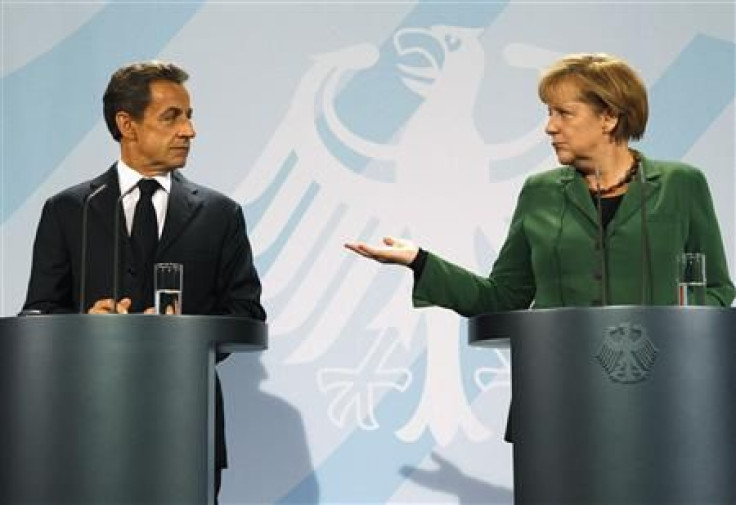Germany, France Strategize to Stabilize the Euro

The leaders of Germany and France have promised to unveil new measures to solve the Eurozone's debt crisis by the end of the month, as international pressure builds for bold steps from Europe to avert an economic backlash of global proportions.
German Chancellor Angela Merkel and French President Nicolas Sarkozy said after talks in Berlin on Sunday evening that their goal was to come up with a sustainable answer for Greece's woes, agree how to recapitalise European banks and present a plan for accelerating economic coordination in the euro zone by a G20 summit in Cannes on November 3-4.
But they declined to reveal any details of their plan. As they met, British Prime Minister David Cameron urged them to take a big bazooka approach to the crisis, telling the Financial Times that Eurozone leaders had to break their cycle of doing a bit too little, a bit too late.
Merkel and Sarkozy were due to hold a working dinner after their news conference.
We are very conscious that France and Germany have a particular responsibility for stabilising the euro, Sarkozy said, standing next to Merkel.
We need to deliver a response that is sustainable and comprehensive. We have decided to provide this response by the end of the month because Europe must solve its problems by the G20 summit in Cannes.
Financial markets were hoping the meeting of the euro zone's top two leaders would produce a breakthrough, and the lack of concrete steps could hurt sentiment on Monday.
It's great to see Sarkozy and Merkel talking, but they have to come up with some firm conclusions on what needs to be done, said Chris Wheeler, an analyst at Mediobanca in London.
The end of the month is a long way away. There has to be some clarity on what we need and it's not coming through.
SUMMIT PRESSURE
Sarkozy will host the Cannes summit and is keen to deliver a big success that might bolster his chances of winning re-election in a presidential vote next year.
The French leader said he and Merkel were in total agreement on the recapitalisation of European banks, even though officials in Paris and Berlin have made clear in recent days that the countries are far apart.
Foreign leaders are looking on in horror at the squabbling, fearful the euro zone crisis could plunge their own economies back into recession.
President Barack Obama on Thursday urged Europe to act fast, calling the crisis the largest obstacle to a recovery in the United States.
Cameron, in an interview with the Financial Times, pressed euro zone leaders to increase the firepower of their 440 billion euro rescue fund -- the European Financial Stability Facility (EFSF) -- and to remove all uncertainty about Greece's economic future.
The British leader said he had conveyed his concerns that the currency bloc was acting too cautiously to Merkel personally over the weekend.
The implosion of Belgian lender Dexia, the first bank to fall victim to the two-year-old euro zone debt crisis, has added a sense of urgency to the talks.
The prime ministers of France and Belgium and the finance minister of Luxembourg agreed a rescue plan for Dexia on Sunday.
Other French banks have also come under intense pressure because of their exposure to Greece.
A senior banker told Reuters in Paris that French politicians were worried that even an orderly Greek debt default could floor French banks and were pushing for action to bolster capital levels.
Paris wants to tap the EFSF to shore up its banks, worried that pouring its own money into them could compromise its coveted triple-A credit rating.
Officials in Berlin have made clear that they believe the fund should be used only as a last resort, when euro zone member states don't have the means to support their banks on their own.
Another area of contention is how to use a new, enhanced EFSF to buy sovereign debt -- an issue that would become particularly crucial if Greece failed to secure a new aid tranche.
Athens is expected to run out of cash as soon as mid-November. Inspectors from the European Commission, the IMF and the European Central Bank -- the so-called troika -- are currently assessing whether the country has fulfilled the criteria for more aid.
Greece has repeatedly failed to meet fiscal targets set out for it by the troika and its economy has performed far worse than predicted.
In addition to addressing the banks and Greece, Merkel said France and Germany were working on steps to boost economic coordination in the euro zone and said their proposals would necessitate changes to the bloc's Lisbon Treaty.
Sarkozy made clear, however, that Europe needed to take decisions now, rather than announce long-term plans that would take time to implement. Changing the treaty could take several years.
Comprehensive, sustainable and rapid responses before the end of the month. That is the result of this Franco-German meeting, he said.
German news agency DPA, citing financial sources, reported on Sunday that euro zone finance ministers were working on scenarios involving a 60 percent reduction in Greece's debt.
(Writing by Noah Barkin; Additional reporting by Andreas Rinke and Yann Le Guernigou in Berlin, Steve Slater and Dominic Lau in London, Sophie Sassard in Paris)
© Copyright Thomson Reuters 2024. All rights reserved.











